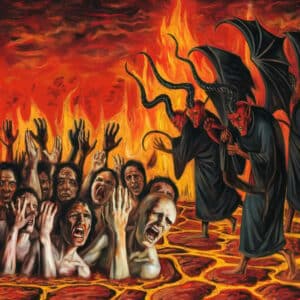

Profanity and spirituality Have you ever thought to yourself, “What the hell?” after making a mistake? Chances are you’re not alone! But while it may be commonplace to whisper an exasperated phrase under your breath, is it really considered a sin? In this article, we will explore what the word “hell” means and examine if there’s any biblical context for its use.
Is saying “what the hell” just a harmless exclamation of frustration, or could it have more dire spiritual implications? Let’s take a look and find out!
Is Saying What the Hell a Sin?
Using the phrase “what the hell” is not sinful in and of itself.
However, depending on its context and the individual’s personal convictions, some might view it as crude or off-putting.
Being mindful of how those around you may receive your words is integral.
If your vocabulary is seen as disrespectful or outrageous, it can negatively affect you, reflecting poorly on you and damaging relationships.
In such cases, it is important to exercise empathy when communicating with others and choose a language that respects their beliefs and is appropriate for the moment.
Exploring the Contradiction of Religion and Profanity
Exploring the contradiction between religion and profanity further reveals a variety of nuances and complexity that can lead to a better understanding of the dynamic interplay between these two concepts.
For instance,
many religious texts use profanity to emphasize certain points or lend greater gravity to them,
suggesting that sometimes its use can be beneficial in conveying the gravity of certain religious messages.
In addition,
some cultures may even view certain taboo words as having sacred connotations and thus not offensive when used in such contexts.
On the other hand,
some find profanity deeply offensive within any context,
regardless of religious associations.
Ultimately,
this example demonstrates how there is not one answer when exploring the relationship between religion and profanity.
Instead,
Why Do Some People Believe Profanity is Sinful?
Many religious groups believe that using profanity or swear words is a sin and goes against their faith.
They believe that using these words to express yourself is disrespectful,
not only to God and their holy scriptures but also to other people.
Additionally,
some cultures around the world view profanity as offensive language that should not be tolerated in public spaces or settings. Furthermore,
it could potentially have a negative effect on how a person is perceived by others and cost them meaningful relationships both professionally and personally.
Why Many People Use Profanity in Everyday Language
Many people use profanity in everyday language as a way to express emotion or create emphasis. Profanity has been shown to increase the intensity of an argument and can be used by people to assert their dominance or to challenge another person’s beliefs.
It is often used as a form of slang and can be seen as cool or edgy in certain social circles.
Profanity also serves as a form of self-expression,
allowing people to express themselves freely without feeling judged.
People may also find it easier to articulate difficult concepts and feelings when swearing is part of their vocabulary.
In addition,
swearing can be seen as an effective way for someone to let off steam in a non-violent manner,
providing a physical outlet for emotions that may otherwise not have an adequate means of expression.
Studies have found that the use of profanity does not necessarily equate with being unintelligent or uneducated; rather,
individuals who use profanity often have an extensive vocabulary and feel comfortable enough with their own words to be able to make them stand out more through the use of swear words.
Furthermore,
some view the use of profanity as a natural way for someone to communicate how they feel–and if done responsibly and with respect.
Implications of Using Profanity from a Christian Perspective
From a Christian perspective,
Furthermore,
Profanity and spirituality most Christians consider the use of profanity to be morally wrong and a sign of disrespect towards other people.
They believe that if people cannot find better words to express themselves,
then they are not demonstrating the virtues of love and humility that Jesus expects from His followers.
In addition,
Profanity and spirituality a Christian lifestyle requires showing self-control in maintaining proper speech habits.
This means refraining from using foul language or any other type of profanity as it will only serve to bring dishonor to God’s name.
Profane words can also lead to hurtful remarks towards others or desensitize speech which can have damaging effects on relationships.
Thus,
it is important for Christians to abstain from any kind of profanity as it undermines their spiritual health and compromises their standing with God and within the faith community.







